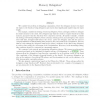116
Voted
CRYPTO
2011
Springer
14 years 24 days ago
2011
Springer
We present a somewhat homomorphic encryption scheme that is both very simple to describe and analyze, and whose security (quantumly) reduces to the worst-case hardness of problems ...
134
click to vote
CRYPTO
2011
Springer
14 years 24 days ago
2011
Springer
In this paper, we initiate a study of zero knowledge proof systems in the presence of sidechannel attacks. Specifically, we consider a setting where a cheating verifier is allow...
138
click to vote
CRYPTO
2011
Springer
14 years 24 days ago
2011
Springer
In CRYPTO 1997, Canetti et al.put forward the intruiging notion of deniable encryption, which (informally) allows a sender and/or receiver, having already performed some encrypted...
122
Voted
CRYPTO
2011
Springer
14 years 24 days ago
2011
Springer
We consider the problem of delegating computation, where the delegator doesn’t even know the input to the function being delegated, and runs in time significantly smaller than ...
111
click to vote
CRYPTO
2011
Springer
14 years 24 days ago
2011
Springer
Secure computation enables mutually suspicious parties to compute a joint function of their private inputs while providing strong security guarantees. Amongst other things, even i...
CRYPTO
2011
Springer
14 years 24 days ago
2011
Springer
114
Voted
CRYPTO
2011
Springer
14 years 24 days ago
2011
Springer
Deterministic public-key encryption, introduced by Bellare, Boldyreva, and O’Neill (CRYPTO ’07), provides an alternative to randomized public-key encryption in various scenari...
123
Voted
CRYPTO
2011
Springer
14 years 24 days ago
2011
Springer
Very few public-key cryptosystems are known that can encrypt and decrypt in time b2+o(1) with conjectured security level 2b against conventional computers and quantum computers. Th...
CRYPTO
2011
Springer
14 years 24 days ago
2011
Springer
94
Voted
CRYPTO
2011
Springer
14 years 24 days ago
2011
Springer
We prove that Tandem-DM, one of the two “classical” schemes for turning a blockcipher of 2n-bit key into a double block length hash function, has birthday-type collision resist...

